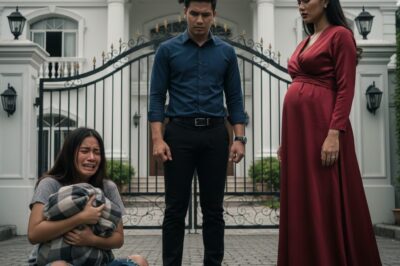
That night the heat pressed down on the tin roof like a smoldering furnace. I lay on my side, back to the creaking ceiling fan, fingers scrolling over my silent phone after Ly’s last call that afternoon: “Tomorrow we’re heading out to the island. Make sure to lock the gate. Don’t stay up too late.”
I had mumbled my usual reply. Without Ly’s footsteps, even the porch light seemed more yellow.
Close to midnight came a sharp knock—thud… thud… thud—quick, decisive, almost panicked.
I shot upright. Outside, a trembling voice slipped through the door gap—Hân’s voice, Ly’s older sister:
“Minh, open the door… please. It’s urgent.”
I unlatched the door.
Hân stood there, drenched in sweat, hair sticking to her temples, wearing only a thin nightgown with a loose coat she hadn’t buttoned. The smell of sun-baked asphalt clung to the entryway. Her eyes were swollen as if she’d been crying. She bit her lip, staring straight at me:
“Let me borrow your wedding ring. And… if anyone asks, say you’re my husband. Just for tonight.”
My face burned; I froze as if someone had slapped me. Heat gusted through my chest. My first thought: Ly… and that ring, the symbol we’d cherished for years. I stammered:
“W-what are you saying… why?”
Hân gripped the doorframe so hard her knuckles went white:
“Mom’s in emergency surgery at the provincial hospital. They need a signature and a family member on watch—‘spouse’ is best to complete the paperwork. I’m no one’s wife anymore. He won’t come. The nurse just said if I don’t finish the forms within half an hour, they’ll have to delay, and that’s dangerous. I called every uncle and aunt but no one can make it in time. I ran from the hospital because I left the documents and my mother’s seal at your place. Please…”
All the blood in me seemed to reroute. I exhaled, nodding before I could count the doubts barricading my mind. I turned into the bedroom, slipped off my ring, grabbed the papers, threw on a shirt and reached for my keys. While I bent to put on my shoes, Hân leaned against the wall, hands shaking so badly she couldn’t fasten her coat. I went over and did it for her. My fingertips brushed the damp fabric and my own heartbeat pounded annoyingly loud. I forced a smile:
“Let’s go. We’ll get to the hospital first. I’ll… put the ring on you when we do the paperwork.”
Hân nodded, eyes darting toward the dark yard as if the night itself might hold her back.
The provincial hospital at midnight felt like another world: cold neon lights, rows of plastic chairs, the sting of disinfectant, doctors’ footsteps echoing down long halls.
In the emergency room, my mother-in-law—the sisters’ mother—lay pale and gasping. The doctor spoke quickly: internal bleeding, immediate intervention needed.
I placed the ring in Hân’s hand. She slipped it on like armor, and together we rushed through the glass doors.
The nurse glanced at the inpatient forms, at Hân, at me.
I heard myself say, like reading lines from a script:
“We’re husband and wife. I’m her husband. We’ll stay and take responsibility.”
Hân’s eyes lowered; her grip on my hand was bone-deep. The nurse nodded, took the papers, pointed where to sign. My hand trembled slightly but my signature stayed steady enough to look honest. When the procedure room doors closed, only the elevator’s sigh filled the corridor.
Hân let go, looking at the silver ring glinting on her finger, her lips moving:
“I’m sorry… for that crazy request. But in that moment, I could only think of Mom.”
I nodded faintly, staring at the empty chair. I spoke as if to myself:
“Family acts like family. The ring’s nothing. Saving someone’s life matters.”
Hân sat beside me, coat damp against my arm. Brokenly, like someone who’d run through a hailstorm, she explained: for months her ex-husband had been pressuring her over the old house their parents left the two sisters, saddling her with debts he’d taken in her name, now pulling every dirty trick. Tonight, when their mother’s pain hit, even as she called the ambulance, the man phoned saying he’d bring a “joint investment contract” in the morning—sign it or he’d “seal off” the property.
I listened, heat and cold twisting in me. That house—the red-brick home down the bougainvillea alley—was where Ly and I once stayed for a year after our wedding, before moving to our apartment. It held the incense bowl for their father, the three-generation starfruit tree, the torn bike seat Ly had perched on as a child. I thought of Ly’s face whenever she spoke of it: “That’s the smell of family.”
“Do you have the papers with you?” I asked.
“Right here.” Hân pointed to a worn canvas bag at her feet. “A photocopy of the title, the documents Mom gave me this morning, and the personal seal… but I left it at your place in my panic. That’s why I…”
She trailed off.
I looked at her hands, knuckles reddened from gripping the motorbike. A memory rose: an early-spring noon when my father-in-law—a thin man always joking—pulled me aside in the yard, pressing a small black-brass key into my palm:
“Minh, son-in-law, you’re steady. Women get desperate sometimes, and there aren’t many men in the family. If one day trouble comes, open the old black bike seat in the shed. Don’t tell them yet. My father hid things there; I’ve hidden things there. What should surface will surface.”
I’d slipped the key into my wallet and forgotten it—until now, when his words flopped back into my mind like a tiny fish.
“Hân,” I said quietly, “In the shed at our place… there’s still that old black bicycle with the torn seat, right?”
Her eyes snapped up.
“Yes. Why?”
“Your father told me once… he hid something there. Probably not money. Maybe documents… in case someone tried something bad.”
Hân looked at me like someone seeing a gap in a blank wall. Under the neon her eyes shimmered faintly. She whispered:
“If Mom makes it through… we’ll go back there right away.”
Mother Pulled Through.
The procedure went well; the doctor told us to stay for observation. Hân slipped the ring back into my hand, fingers fumbling like a child who’d just broken a bowl.
“Thank you.” That was all.
I slid it back onto my finger; my knuckles suddenly felt lighter.
Dawn crept in, a thin streak of pink across the windowpane. Instead of going back to my house, we drove straight to the old one. The alley was still dotted with bougainvillea leaves. The door was locked. Hân unlocked it; the cool tile floor smelled of old paint and damp. In the storage room a black bicycle leaned in the corner, its frame turned rusty-brown. I pulled the small black-brass key from my wallet, slipped it into the seat lock. It fit as if made for it.
A soft, relieving click.
Under the torn seat covering was a plastic tube wrapped in tape. I peeled it open. Inside lay a thick, sealed envelope, the red wax faded. On the front, in Father’s handwriting:
“To the one who still remembers to guard this house as one guards the honor of the ancestors.”
We looked at each other. Hân held her breath as if afraid a name from the past would leap out.
I tore the envelope open. Inside were:
(1) a notarized will dated two years ago—stating the house was jointly owned by the two sisters, but that any disposal of the property had to be agreed upon by the “caretaker of the ancestral altar” during a three-year transition;
(2) a notarized authorization naming me—Minh—as temporary manager of all procedures relating to the house “in case the two daughters are busy or entangled”;
(3) a prepared petition to “revoke any investment or loan transactions” if the other party was “Mr. L.”—Hân’s ex-husband—complete with the original family seal;
(4) a handwritten letter.
I read the letter. Father’s handwriting was almost laughing:
“Minh, you’re a quiet engineer but you know how to mind a house. I know you blush when I talk to you about ancestral affairs, but this home needs a man who fears what’s right. One of my daughters is fire (Hân), the other water (Ly). Fire meets wind and flares; water meets a bank and stops. You’re the bank. If life bends them, straighten them. A house isn’t just walls; it’s where the incense bowl stays upright. If anyone tells you you’re meddling in your wife’s family, ignore it. When the time comes, open the bike seat and take your support.”
I folded the letter; my heart felt as though someone had set another brick on it—heavy but firm.
“Oh my God…” Hân whispered. “Father… prepared everything.”
Before we could speak more, the sound of a motorbike outside. Voices. Hân glanced through the window. Her ex-husband—L., slicked hair, white shirt—strode into the yard with two young men, not even bothering to knock. He pounded on the door like swatting a fly:
“Open up! Sign the investment papers now! Don’t waste my time.”
I shoved the documents back into the envelope, into my jacket.
Hân straightened her coat and opened the door.
L. glanced at me, smirked:
“Ah, the brother-in-law’s here too. Good. Sign quickly and I’ll give back the 500 million you ‘borrowed’ from me.”
“You borrowed it under my name. You know that.” Hân’s voice cut. “And my mother is in the hospital. Get out.”
“Sick or not, this house is also where I lived. I have rights.” He waved a stack of pre-printed papers, the words “investment in homestay project” visible.
I stepped onto the porch, trying to stay calm:
“Mr. L., we’ve just found the notarized will and documents. Any transaction involving this house must be agreed upon with the caretaker of the ancestral altar during the three-year transition. I am that person, by authorization of my father-in-law.”
L. sneered:
“Authorization? Your father-in-law’s dead. Authorization’s void.”
“These documents are still valid, notarized for three years. And here’s a prepared petition to revoke all transactions if the other party is you.” I held up the envelope, showing the bright red seal with his name. “We’ll handle this at the notary office now. They’ll decide what’s valid.”
He hesitated, then gave a dry laugh, signaling the two men to step forward. One flicked a cigarette butt against the porch like a mark.
Hân blocked the doorway—small but her eyes burned.
I placed my hand on my phone, dialed the local police, put it on speaker:
“We’re being threatened over property. Please send officers to file a report.”
A neighbor passing by stopped and called out loudly:
“Mr. L.! Don’t do anything stupid. The memorial’s coming up.”
The word “memorial” made the young men falter—heavier than any pre-printed contract.
A police siren rose sooner than I expected. Officers arrived, glanced over the papers. A sharp-eyed young officer turned the red seal over, checked the will and authorization, nodded:
“These documents are sufficient to halt any transactions for now. All parties must come to the People’s Committee and notary office tomorrow. Tonight you’re required to disperse.”
L. muttered curses, kicked the wall, and stalked off with his men, throwing back:
“Fine. See how long you can hold it.”
The gate closed; the alley returned to cicada song.
Hân sank onto the step, hands over her face. I leaned against a column, breathing as if I’d run a hundred meters. In my jacket pocket the envelope thumped like a second heart.
Morning brought a light rain.
I drove Hân back to the hospital to report Mother out of danger. They moved her to a regular room. She was frail and pale as a banana shoot. Her hand clasped Hân’s, then reached for mine:
“Minh… my son…”
I bent close, answering softly. She looked into my eyes for a long moment, as if trying to speak but the words hadn’t lined up yet. I wanted to tell her about the night, the bike seat, but Hân gave a tiny shake of her head. I understood. Some news must wait, like choosing the right day to go to sea in a storm.
Just outside the hospital, my phone vibrated. Ly calling. Her sun-and-sea-wind face filled the screen.
I answered; before I could say hello, Ly’s voice dropped low:
“I’m on my way back. Hân called me at dawn. I knew she’d go to you. Are you… angry at me if I tell you… I’m the one who told her to ask you?”
I paused, then smiled:
“I thought you were asleep, clueless. Turns out… you’re sly.”
“Sly enough… to trust my husband.” Ly laughed softly, then serious: “That house… is my heart. I know my sister’s in trouble but she always bears it alone. I told her: ‘Go to Minh. Knock on his door. Even at midnight. He’ll go with you.’ Please… don’t be mad about the ring.”
I looked at my hand. The ring sat there as if it had never left. An invisible thread stitched the three of us to the red-brick yard. I said:
“I’m not mad. I just… feel for our family.”
“I’ll be home this afternoon. Take care of her.”
Ly hung up. Beside me, Hân stood silent, eyes on the rain streaking the window. I told her about the call. She exhaled:
“My sister’s always gentle enough to burn anger out of others, and wise enough to awaken kindness. I’ve been circling too long.”
I didn’t answer. Instead, I opened the envelope again and handed Father’s letter to Hân. She read to the line about “fire and water,” smiling through tears:
“Father knew everything.”
“And Father left a way.” I said. “Tomorrow we’ll go to the notary and the committee. With these papers they have to void that ‘investment.’ As for the debt in your name, we’ll ask a lawyer—my sister knows one—to verify and collect evidence that he used the money for himself.”
“I don’t want to drag you into this mud.”
“I’m already at this house’s gate—good or bad, it’s mine too.” I smiled, remembering the rough bricks I’d replaced years ago, before they were painted. “Besides, Father already picked me to ‘mind the incense bowl.’”
Hân nodded, her hand resting on the envelope as if on a child’s forehead.
The session at the notary office the next morning was oddly orderly. Papers clear as daylight. The notary flipped page after page, comparing seals. She read aloud the clause “property disposal must be agreed by the caretaker of the ancestral altar” and “temporary authorization to Mr. Nguyễn Minh.” Her dry voice was oddly satisfying. L. gave a few strained laughs, then fell silent. When she reached the petition “revoking all investment transactions with Mr. L.,” the notary looked him straight in the eye:
“According to this, any such transaction is null. Prepare to settle separately, or we’ll refer it to investigators.”
L. glared at us like an enemy across a trench, then left, his polished shoes stumbling off-beat.
That afternoon Ly came home. She stepped into her mother’s hospital room, the scent of the sea still on her shirt. After hugging her mother she beckoned me into the corridor. Sunset lit her cheek as she asked:
“Last night—did you blush?”
“Yes.” I laughed. “Your sister knocked, dripping sweat, and I… got shy. But I blushed not because of the thin nightgown, but because of one sentence: ‘Be my husband for one night.’ I thought of you, of my vow, of the ring. I felt ridiculous that such a small thing could weigh like stone. But then… Mom.”
Ly leaned on the railing, finger tapping lightly:
“I pictured it exactly. And I trusted you. That’s why I told her to knock at our door, no one else’s. I also knew Father hid something under that seat for ‘whoever still remembers to guard the house as one guards honor.’ He mumbled it once when drunk. I didn’t know details. But I understood whom he trusted. Turns out… it’s you.”
I told Ly about the envelope, the will, the revocation petition, the “fire and water” letter. Ly listened, eyes misting, then smiled:
“Father was wiser than we thought.”
“Father planned for storms we hadn’t imagined,” I said. “And even wrote the steering motto: ‘A man who fears what’s right.’”
Ly nodded. She touched the ring on my hand:
“Where did the ring go last night?”
“Back where it belonged right after the ‘ritual.’ I told your sister to return it, because you’re the one who should wear it.”
“Good.” Ly smiled, lips curving. “Then lend it back to me—forever.”
We both laughed. On the hospital balcony, the water-willows in their planters seemed to sigh with relief.
A week later, Mother was discharged from the hospital. The red-brick house opened its door to the whole family, breathing out the smell of damp wood, of green starfruit, of a shy kitchen fire. Ly busied herself in the kitchen, while Hân hung their father’s black-and-white photograph a little higher. I adjusted the family altar, straightening the incense bowl. Beside us, the bicycle seat had been put back on, and the black brass lock now rested quietly in the kitchen drawer—like a baby tooth fallen out to make way for a new one.
That evening, relatives dropped by in twos and threes. Everyone had already heard whispers about the “investment” and how it had been “canceled.” Mother sat on the wooden platform, sipping thin porridge, her eyes now and then glinting toward us. When only the three of us remained, Hân brought out a wooden box and set it before us.
“I have something… I’ve been hiding. I think it’s time to say it now.”
Ly and I looked at her. Hân opened the box. Inside lay a stack of papers and… a bank card. She pushed it toward me.
“Last year, when you lost your job, when the new apartment was about to reach the final payment, you and Ly couldn’t come up with the money. You two didn’t tell anyone. But I knew. I borrowed from a friend, then—stupidly—listened to L. and put the loan under my name to cover it for you. I hid it because I didn’t want to wound your pride or your sister’s. That’s how L. latched on. The night Mother fell ill and the ‘investment’ call came, I knew he was using that loan to force me. I ran to your house not just for the ring. But because… I knew only you could straighten this out.”
I sat still, listening to the wall clock’s tick leap from mark to mark. Ly laid her hand on her sister’s:
“Why didn’t you tell us sooner?”
“Because your pride is the size of a mountain.” Hân smiled, eyes wet. “And I’m used to clutching everything and grumbling to myself. Father knew this blood in me, so he left the envelope for someone else to open.”
I pushed the box back to her.
“This house repays you with hot meals every day. As for the money, we’ll handle it together. First thing tomorrow—go to the bank and sort it out. Second—go to the local police and provide more evidence. Third—eat a huge starfruit hotpot together.”
Hân burst out laughing. Ly gave me a fond scowl:
“Always hotpot. This house has a problem and Minh calls for hotpot.”
I laced my fingers together, looking at the two sisters—one fire, one water—slowly blending like sour soup beside a clay pot of braised fish. I thought of Father’s letter, of the sweat from the night Hân knocked on my door, of the ring slipping over her finger for a fleeting moment heavy as an oath—an oath passed temporarily, not of love but of responsibility. I suddenly understood: some things make you blush not from shame, but from your own heart reminding you to stand upright.
Outside, the wind tapped lightly at the bougainvillea trellis. A tiny lizard darted across, leaving a shadow like a comma on the wall. Mother coughed softly in the inner room. Ly rose to pour water. Hân suddenly called me:
“Minh.”
“Yes?”
“That night… if you hadn’t opened the door, I think I would’ve collapsed. Thank you for opening. But thank you, too, for closing at the right time.”
“Closing what?”
“Another door.” Hân winked. “The door leading to something easy to go wrong.”
I understood. And I laughed:
“That door’s locked now. The key is the ring.”
The three of us looked at each other. In the corner, Father’s picture smiled, gap-toothed. I imagined him pointing at the bicycle seat as if to say: “You can hide papers there, but not people’s hearts.”
Later that night, Ly sat beside me on the porch step, legs swinging. The house was so quiet we could hear the drip of water in the flowerpot. Ly rested her head on my shoulder.
“I have another secret.”
“Another one?” I pretended to groan.
“This one… Hân knows. Father knows. I just haven’t had the chance to tell you: When I was ten, I ‘came’ to this house. Father took me in from a flood in the Central region. I’m not Hân’s blood sister. But Father never once let us feel any difference. I’m telling you this so you’ll understand why I’m so afraid of losing this house: it’s not just brick walls; it’s where I was born a second time.”
I was silent for a long time. Then I said softly:
“I love this house because you’re in it. You love it because of Father. And Father loved it because it held the ancestors. Three different loves meeting at the incense bowl. So… keeping the house means keeping that meeting point.”
Ly nodded, her eyes sparkling as if she’d just found a coin at the bottom of a well:
“That’s why Father authorized you. The old man was sly.”
“Yeah.” I smiled. “He even knew to hide things under the seat. Anyone who’s ever ridden an old bike knows the seat is what you sit on, the heaviest point. Hide the heavy stuff where weight is used to—less chance of breaking.”
Ly laughed, pressing her cheek against my shoulder. Hân came out carrying three cups of hot tea. She set them down, teasing:
“Give the ‘keeper of the incense fire’ some tea so he’ll stop… blushing.”
I lifted the cup, blowing on the steam:
“Next time you knock at midnight, wear a thicker coat. It’ll save me from… confusion.”
Hân laughed out loud:
“I told you that door’s locked.”
Three cups of thin steam. Beyond the wall, the incense bowl sent up a single rich thread of smoke. The old house felt as though it had just stepped over an invisible fence, from a cracked field into a plot suddenly washed by rain.
Somewhere, someone still thinks this story began with a flimsy nightgown. In truth, it began with a knock at the door—and ended with another door locked tight from within. And between those two doors, we met each other not in a slip, but in a stand.
News
Naghiwalay kami. Inangkin ng ex-husband ko ang bahay sa pangunahing kalsada. Tinanggap ko ang wasak na bahay sa eskinita—ng araw na ipagigiba iyon, buong pamilya nila ay lumuhod sa lupa…/th
Ako si Hana, 34 taong gulang, dating asawa ni Eric—isang lalaking matagumpay, gwapo, at mahusay magsalita. Noong bagong kasal pa lang…
May sakit ang anak ko at kailangan ng pera. Pinuntahan ko ang dati kong asawa—itinapon niya ang isang punit na damit at pinalayas ako. Nang suriin ko iyon, nanigas ako sa nakita ko…/th
Ako si Lia, at halos dalawang taon na kaming hiwalay ni Daniel. Mabilis ang hiwalayan—walang luha, walang habol. Sumama siya sa bagong babae,…
Nang malaman ng biyenan ko na kumikita ako ng 50 milyon kada buwan, pilit niyang ipinauwi ang tatlong kapatid ng tiyuhin ng asawa ko mula sa bukid para tumira kasama namin—at inutusan akong pagsilbihan sila. Tahimik akong nagplano, at isang araw lang ang lumipas, may nangyaring hindi nila inasahan/th
Mula nang malaman ng biyenan ko na 50 milyon ang buwanang kita ko, biglang nagbago ang ugali niya.Wala nang panunumbat.Wala…
“Binuhusan ng asawa ang ulo ng kanyang misis ng bagoong para lang mapasaya ang keridang buntis daw ng anak na lalaki—ngunit hindi niya inakalang makalipas lamang ang sampung minuto, ang buong pamilya ng babae ang magpapakita ng isang matinding paghihiganti, na mag-iiwan sa kabit na walang kalaban-laban.”/th
Ang lalaking minsan kong tinawag na asawa—sa harap ko at ng babaeng kinakasama niya—ay biglang binuhat ang isang mangkok ng…
Namatay ang kuya kong may sakit sa pag-iisip — alam kong may naglason sa kanya…/TH
Ako si Andrea. Tanda ko pa noong 8 years old pa lang ako. Si Kuya Joel ay may sakit sa…
IKAKASAL NA KAMI BUKAS PERO BIGLA SIYANG NAWALA NA PARANG BULA/th
Ako si Joy. Bukas na sana ang kasal namin ni Marco. Nakaayos na ang lahat, ang simbahan, ang gown ko,…
End of content
No more pages to load












